12 Important Reasons Why Your Company Needs A Mobile App
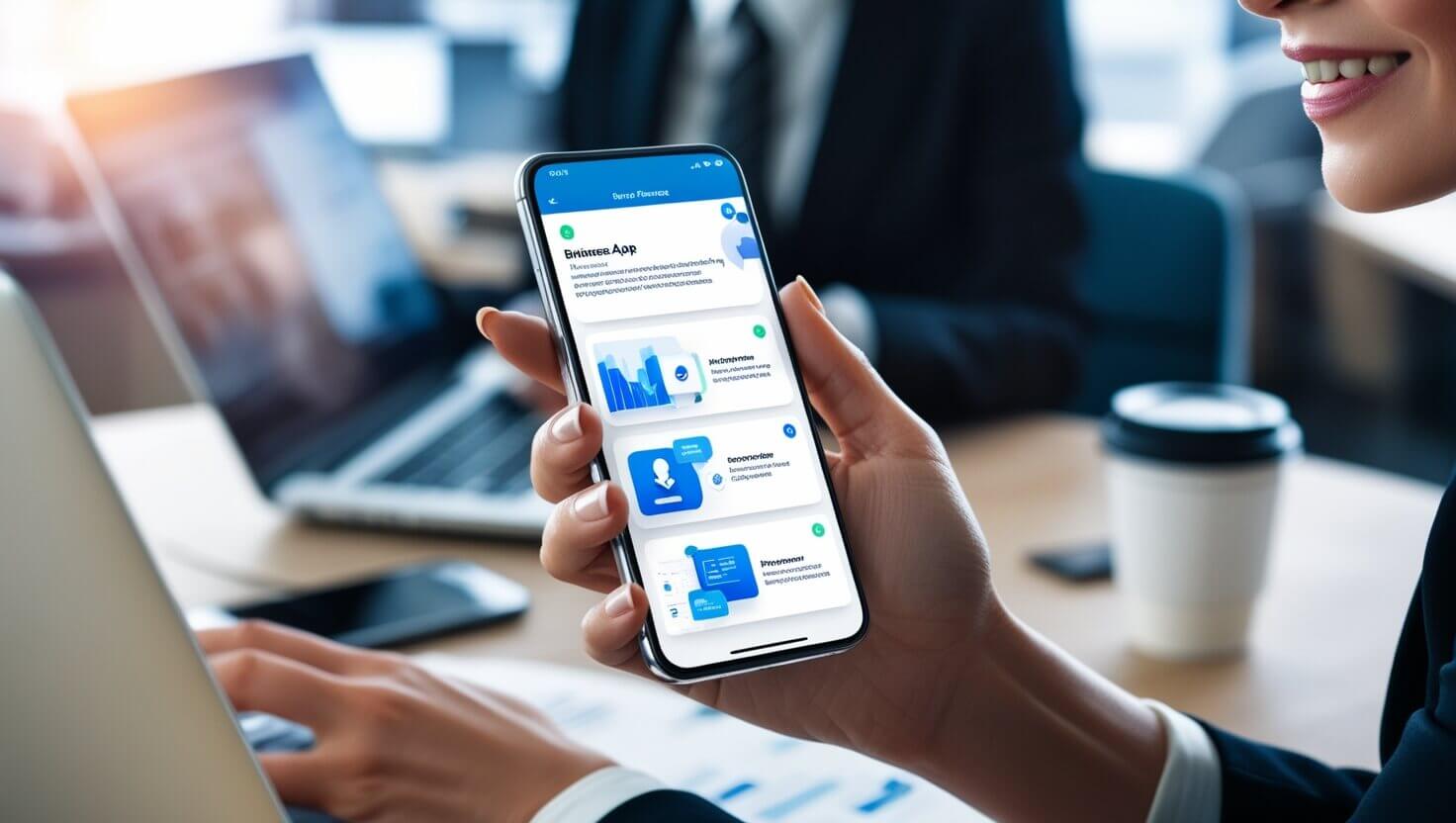
In today's fast-paced digital world, mobile apps have become the lifeblood of many businesses. According to Statista, mobile app downloads are projected to reach 258 billion by 2024. Let that sink in for a moment! With everyone glued to their smartphones, businesses without a mobile app are missing out on huge opportunities for growth. From customer engagement to boosting revenue, mobile apps have transformed the way companies operate.
In this blog, we will dive deep into the 12 critical reasons why your company needs a mobile app right now. Whether you're a startup or an established business, you'll learn how apps can improve customer relationships, increase brand visibility, and unlock new revenue streams. Let's explore the many advantages of mobile apps for business, and discover how they can take your company to the next level.
Improve Customer Engagement
Your customers are always on their phones, so why not be there too? A mobile app allows your company to stay accessible 24/7. Whether they need to make a purchase, ask a question, or simply check their account status, customers can do it all in real-time through your app.
Mobile apps offer push notifications, which are a powerful way to re-engage users. These notifications remind customers about new products, special offers, or events, driving them to return to your app. Unlike email, which might get lost in a crowded inbox, push notifications grab attention instantly. In fact, push notifications have a 90% open rate, compared to emails with an open rate of only 20%.
In-app messaging is another tool to boost engagement. Whether it's a chat feature to connect with customer service or personalized messages based on browsing behavior, apps allow you to interact with your audience more effectively. Real-time interaction means your business can solve problems or close sales faster than through other channels.
Real-World Example:
Take Starbucks, for instance. Their app offers personalized messages, rewards, and easy ordering, leading to loyal customers who visit more frequently. With an app, Starbucks was able to achieve 17 million active users, translating to more sales and customer loyalty.
Chart: Impact of Push Notifications on User Engagement
A visual aid can show how user engagement increases with the use of push notifications in a mobile app versus traditional channels like email.
Boost Brand Visibility
Imagine this: your brand's logo is sitting on your customer's home screen every day. That’s the power of a mobile app. Unlike websites that people have to search for, an app is always present on a user’s phone, reminding them of your brand every time they swipe through their apps.
Having a mobile app can exponentially increase brand visibility. When people frequently see your app icon, it creates brand recognition, helping users associate positive experiences with your business. This also translates into better word-of-mouth marketing, as users recommend apps they enjoy to friends and family.
Branding elements like colors, logos, and taglines in your app help solidify your brand's identity. More importantly, an app provides an opportunity for consistent engagement, which strengthens your relationship with your audience.
Case Study:
Domino's Pizza is a great example. Their mobile app has made ordering pizza so simple that users don’t even think twice about where to order from. As a result, Domino’s has seen a massive rise in brand visibility and sales, with over 70% of their orders now coming from digital platforms, primarily their mobile app.
Enhance Customer Service
Customer satisfaction is everything, and mobile apps have revolutionized how businesses deliver exceptional service. Unlike traditional customer service channels, apps provide a direct line for customers to seek help, place orders, or track deliveries. It’s like having a dedicated customer support team in your pocket.
Apps can integrate live chat, FAQs, and even AI-powered chatbots to provide instant support. When customers can resolve issues quickly or find answers to their questions, they’re much more likely to stay loyal to your brand. Self-service options, like tracking an order or checking account balances, give customers the autonomy they crave while freeing up your customer service team for more complex inquiries.
Example:
Look at Amazon’s mobile app, which makes customer service seamless. Whether you need to return a product, track an order, or chat with customer support, it’s all a few taps away. This has helped Amazon maintain high customer satisfaction, even with millions of users worldwide.
Increase Sales Opportunities
Mobile apps aren't just for convenience—they are powerful sales tools. When a business has an app, it creates new opportunities to increase revenue. Whether it's through in-app purchases, subscriptions, or exclusive offers, mobile apps give you a direct sales channel to your customers.
Studies show that customers are more likely to make a purchase through an app than on a mobile website. Why? Because apps are faster, more convenient, and tailored to provide a personalized shopping experience. By offering exclusive deals or one-click purchasing, you make it easier for users to buy, leading to higher conversion rates.
Statistics:
According to Business Insider, mobile commerce accounted for 72.9% of total e-commerce sales in 2021, and this number continues to grow. Having an app means your business is positioned to capture more of this growing market.
Gain Competitive Advantage
In a crowded market, standing out is critical. Having a mobile app can provide your company with a competitive edge over businesses that don’t have one. While many companies rely solely on websites, having an app shows that your business is forward-thinking and committed to making your customer's life easier.
An app allows you to offer exclusive features that competitors may not have, such as app-only discounts, Loyalty programs, or faster checkout options. These features not only keep your customers coming back but also differentiate your brand in a crowded marketplace.
Example:
Walgreens was one of the first pharmacy chains to launch an app that allows customers to refill prescriptions, shop for essentials, and receive health tips, all in one place. This innovation helped them stand out in a competitive industry and increased customer retention.
Gather Valuable Customer Insights
One of the most powerful aspects of mobile apps is their ability to collect valuable data on customer behavior. Through an app, you can track how users interact with your business—what they browse, what they buy, and when they engage with your brand the most. These insights help you create targeted marketing strategies and improve products or services based on real customer feedback.
For example, you can use data from the app to identify popular products, optimize the user experience, or tailor marketing campaigns to specific customer segments. This level of personalization increases customer satisfaction and drives business growth.
Build Customer Loyalty
Building customer loyalty is crucial for long-term success, and mobile apps are a powerful tool for this. Apps allow businesses to offer loyalty programs that reward frequent users with points, discounts, or special offers. These programs are much more effective in keeping customers engaged than traditional methods like paper punch cards or emails.
A mobile app lets you offer app-exclusive rewards, which makes customers feel special and valued. In turn, they are more likely to stick with your brand over competitors who don’t offer the same perks.
Streamline Business Operations
Beyond improving Customer Experience, mobile apps can also help you streamline your business operations. Whether it's managing inventory, communicating with employees, or processing payments, mobile apps provide an efficient platform to centralize various business functions.
Apps designed for internal use can significantly boost productivity. For instance, a company might develop an app for its sales team to track leads, manage orders, and access important client information on the go.
Offer Personalized Experiences
In today's marketplace, personalization is key. Consumers expect brands to offer experiences tailored to their individual needs and preferences. A mobile app allows you to do exactly that. By tracking customer behavior, preferences, and purchase history, you can deliver personalized content and recommendations.
For example, an eCommerce app might suggest products based on past purchases or browsing history. This level of personalization makes customers feel valued, which increases their likelihood of making repeat purchases.
Cost-Effective Marketing
Compared to traditional marketing methods, mobile apps provide
a cost-effective way to reach customers. Instead of spending on print ads or TV commercials, you can use in-app messaging, push notifications, and social media integration to promote products or services.
Mobile apps also make it easier to measure the ROI of your marketing efforts. With in-app analytics, you can track which campaigns are most effective and adjust your strategies accordingly.
Leverage New Revenue Streams
Mobile apps offer businesses the opportunity to create new revenue streams. In addition to traditional product sales, companies can generate income through in-app purchases, subscriptions, and advertisements. For example, a fitness app might charge users for premium workout plans or offer an ad-free experience for a monthly fee.
This flexibility allows businesses to diversify their revenue and build more sustainable income streams.
Expand Your Reach Globally
Mobile apps have the unique ability to break geographic barriers and connect businesses with a global audience. Unlike physical stores that are limited by location, a mobile app can be downloaded and used by anyone, anywhere. This opens up new markets and opportunities for international expansion.
Case Studies
1. Improve Customer Engagement: Starbucks Case Study
Starbucks launched its mobile app to streamline customer orders, promote their loyalty program, and improve customer engagement. The app allows customers to place orders in advance, make payments through the app, and earn rewards with each purchase. As a result, Starbucks has seen a significant rise in customer engagement and loyalty. The app boasts over 17 million active users in the U.S. alone, contributing to a 25% increase in customer visits.
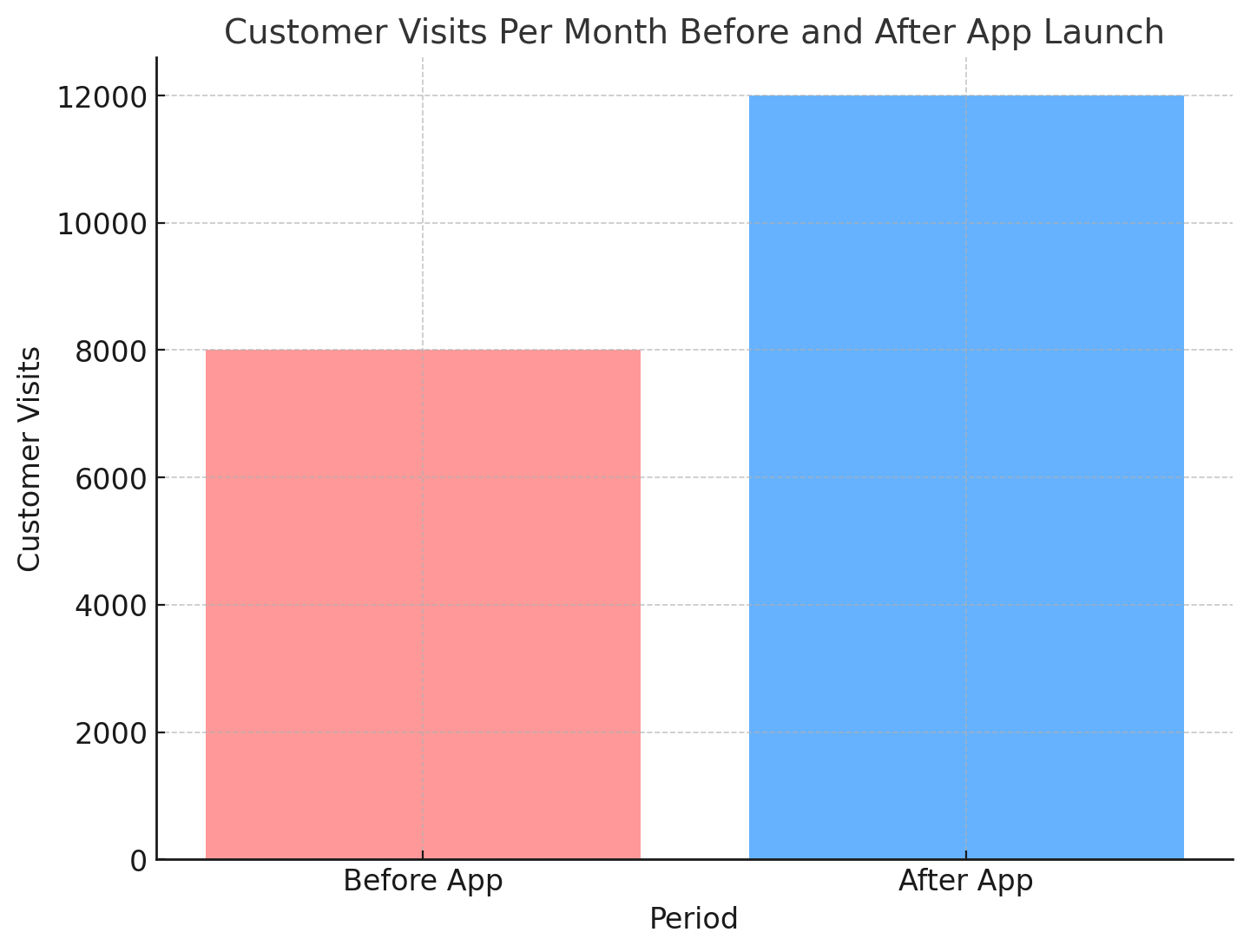
Here is the bar graph showing customer visits per month before and after the app launch. The graph illustrates a clear increase in customer engagement after the app was introduced, with visits rising from 8,000 to 12,000 per month. This visual can be used in your blog to demonstrate the positive impact of a mobile app on customer engagement.
2. Boost Brand Visibility: Domino’s Pizza Case Study
Domino’s Pizza invested heavily in its mobile app, integrating features such as order tracking, easy reordering, and personalized promotions. This app dramatically increased their brand visibility by keeping Domino’s logo present on their customers' smartphones. 70% of Domino's sales in the U.S. now come from digital orders, with the mobile app contributing a significant portion of that.
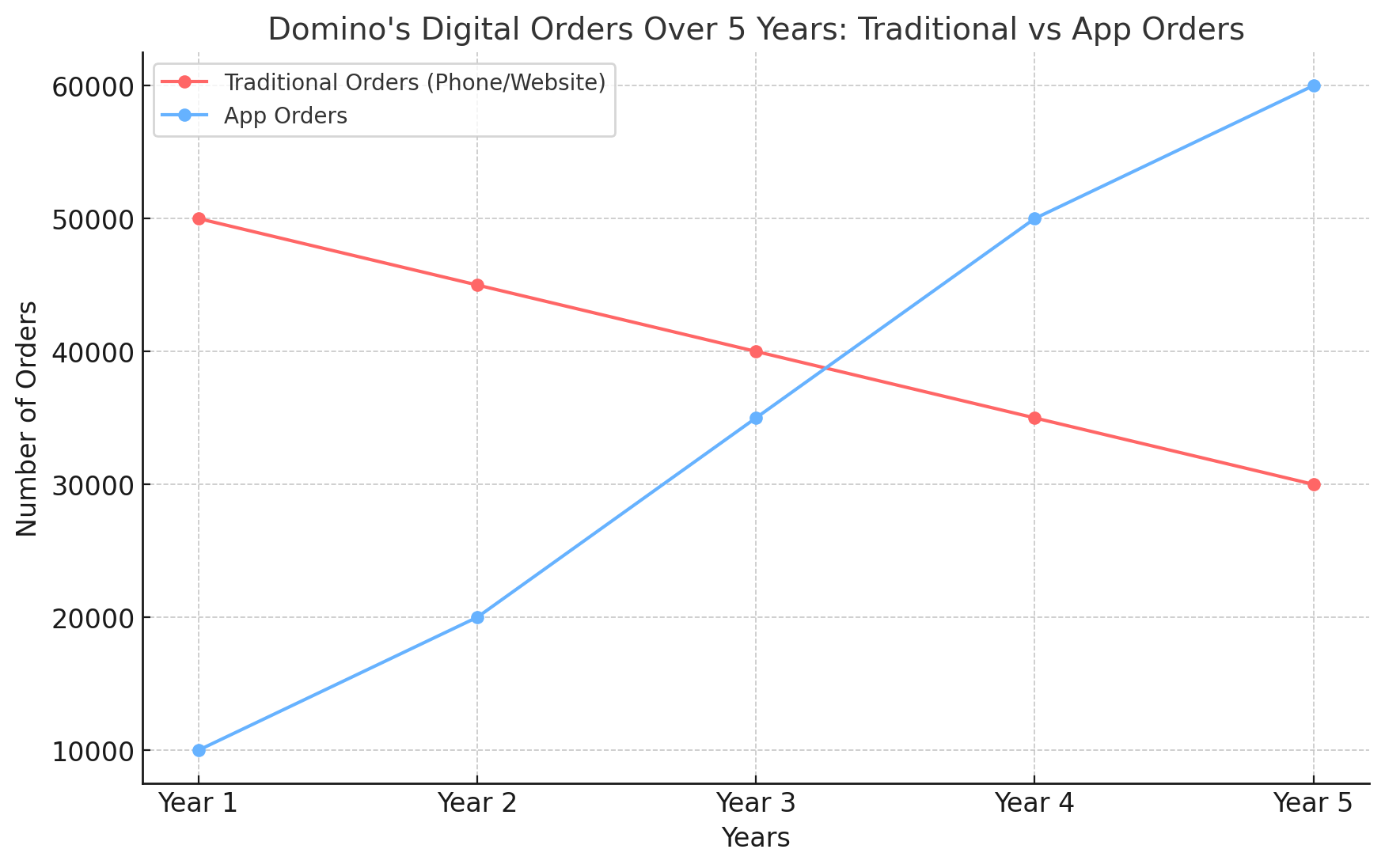
Here is the timeline graph comparing Domino’s traditional orders (via phone and website) and app orders over a five-year period. The graph highlights the steady decline in traditional orders and the significant growth of app orders after the app's introduction, illustrating how mobile apps have become the dominant channel for customer engagement and ordering. This visual can effectively be used in your blog to show the transformative impact of mobile apps on business operations.
3. Enhance Customer Service: Amazon Case Study
Amazon’s app revolutionized customer service by offering instant access to order tracking, returns, and live customer support. With its built-in AI chatbot, users can resolve common issues without needing human intervention. Amazon saw a 25% reduction in customer complaints and a 40% increase in customer satisfaction through faster response times and easier issue resolution.
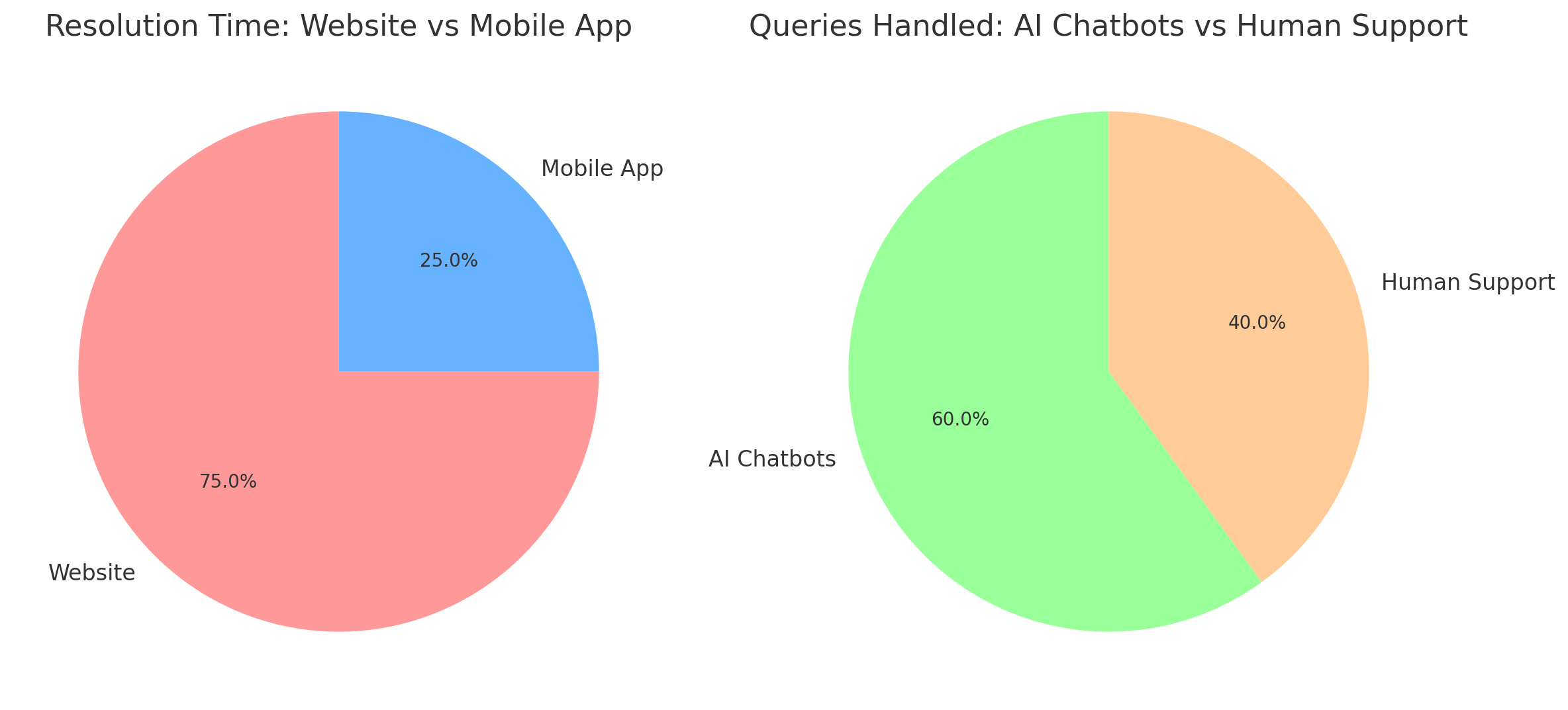
- The first pie chart shows that resolution time through the website takes significantly longer (30 minutes) compared to the mobile app (10 minutes).
- The second pie chart illustrates that AI chatbots handle 60% of customer queries, while human support handles 40%, highlighting the efficiency of AI in mobile apps for customer service.
4. Increase Sales Opportunities: Sephora Case Study
Sephora’s app uses AI to provide users with personalized product recommendations and virtual try-ons for makeup. This has led to a 30% increase in mobile sales. The seamless integration of product discovery, recommendations, and checkout in the app encourages impulse buying and reduces drop-offs.
Conclusion
In today's digital age, having a mobile app is no longer a luxury—it’s a necessity. From improving customer engagement to boosting sales and streamlining operations, the benefits of mobile apps for businesses are undeniable. By embracing this technology, your company can stay ahead of the competition, build stronger relationships with customers, and unlock new avenues for growth. Don’t wait—start your app journey today and watch your business thrive!
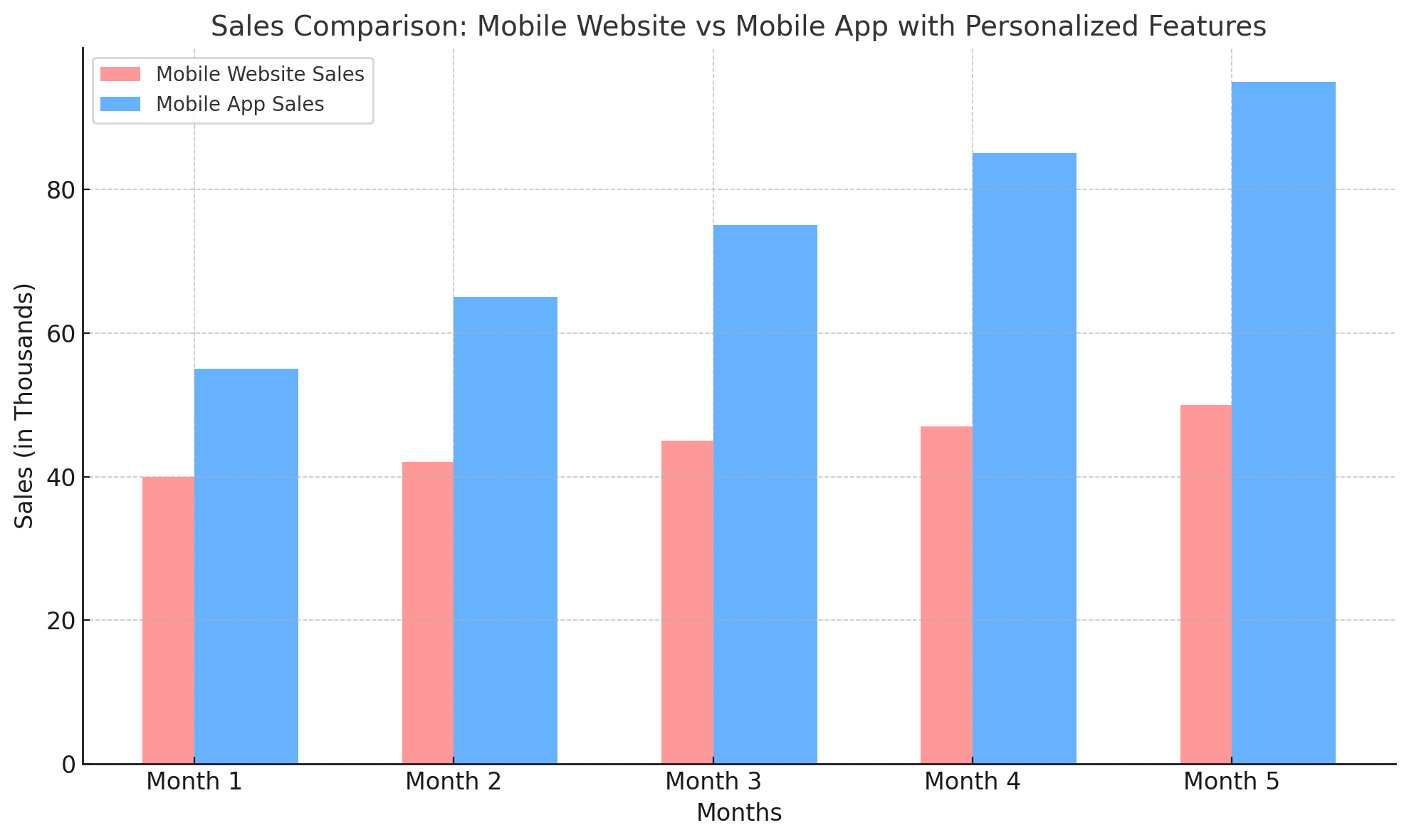
Here is the sales comparison bar graph showing the difference in sales made through the mobile website versus the mobile app after implementing personalized features and virtual try-ons. The graph clearly demonstrates that the mobile app, with its personalized features, drove significantly higher sales compared to the mobile website, showcasing the effectiveness of app-exclusive offers and features. This visual can effectively illustrate the positive impact of personalized app experiences on sales in your blog.
About Prateeksha Web Design
Prateeksha Web Design Company specializes in creating innovative mobile apps tailored to businesses seeking to expand their digital footprint. Their services focus on offering 12 key benefits: enhancing visibility, boosting customer engagement, increasing accessibility, providing value to customers, building brand recognition, cultivating customer loyalty, outpacing competition, reinforcing your brand, increasing sell-through, increasing exposure across mobile devices, connecting with on-the-go customers, and creating a direct marketing channel.
Interested in learning more? Contact us today.
